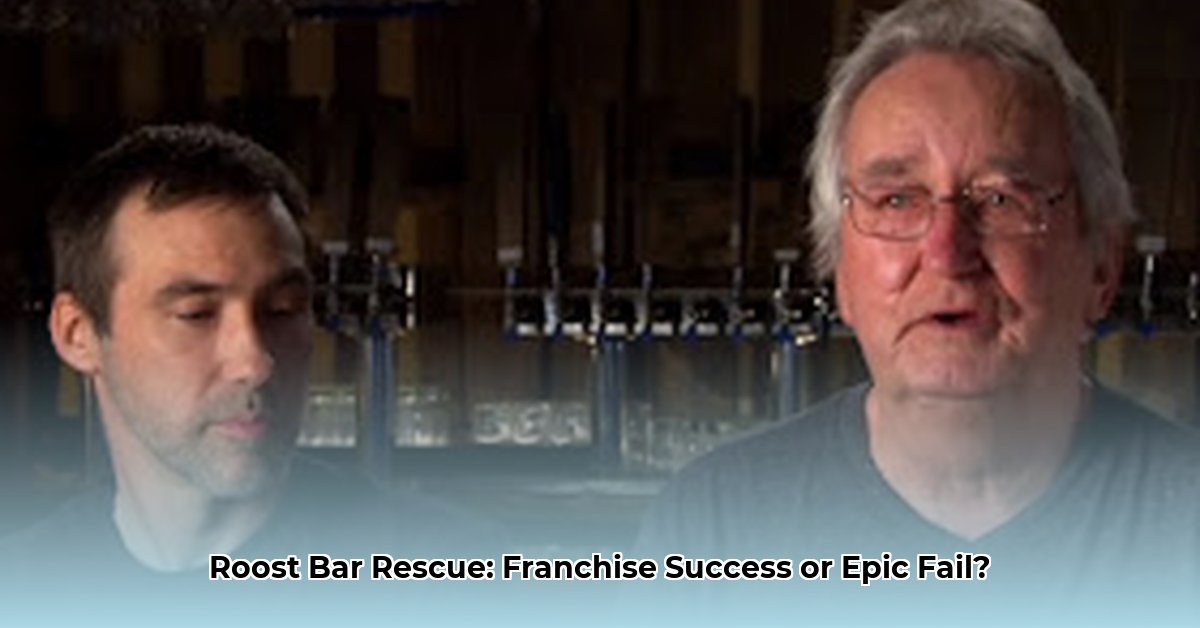Jon Taffer’s “Bar Rescue” aims to revive struggling bars with makeovers and operational guidance. But how do these establishments fare long-term? This case study examines “The Roost,” a bar that received a Bar Rescue transformation and then expanded into a franchise, to analyze its varied outcomes.
Analyzing Factors Contributing to Bar Rescue Outcomes
The post-rescue performance of The Roost locations demonstrated a wide spectrum, with initial success often proving short-lived. Some locations experienced an immediate surge in business, paying down debts and enjoying profitability. However, the COVID-19 pandemic significantly impacted the hospitality industry, leading to permanent closures for some Roost locations.
The human aspect significantly influenced the outcomes. Dedicated owners who embraced Taffer’s advice, implemented consistent staff training, and maintained high quality control were more likely to achieve lasting success. Conversely, owners lacking dedication or struggling with internal conflicts often saw their Roost locations struggle, highlighting the crucial role of post-rescue leadership and management.
Beyond immediate makeovers, broader business factors played a critical role. The standardization of “The Roost” brand across locations created challenges in differentiation, with inconsistent customer experiences potentially hindering brand loyalty. The pandemic underscored the need for adaptable business models, as many locations lacked the infrastructure to navigate lockdowns and restrictions.
Key insights include understanding that a makeover is just the beginning. Long-term viability rests on solid management, a well-defined business plan, and adaptability. Investing in ongoing training, fostering a strong team, and proactively adapting to market changes are essential. Ignoring these foundational elements increases the risk of failure, regardless of the initial transformation.
Let’s consider actionable steps for different stakeholders:
| Stakeholder | Short-Term Actions | Long-Term Strategies |
|---|---|---|
| Franchise Owners | Invest in consistent staff training; Maintain quality; Develop adaptable business models | Implement targeted marketing; Cultivate strong community relationships; Conduct regular market research |
| Bar Rescue Team | Provide long-term support and mentorship; Incorporate pandemic preparedness planning; Refine the franchise model | Develop more comprehensive business plans; Implement robust owner screening processes; Foster ongoing mentorship programs |
| Customers | Check recent online reviews; Be mindful of potential variations in quality across different locations | Support local businesses; Leave honest reviews to assist other customers |
Reviewing risks is also essential:
| Risk Factor | Likelihood | Impact | Mitigation Strategy |
|---|---|---|---|
| Weak Management | High | High | Rigorous owner vetting; Consistent operational support; Key Performance Indicator (KPI) tracking and analysis |
| Economic Instability | Medium | High | Diversified revenue streams; Prudent financial management; Emergency funding reserves |
| Negative Customer Feedback | Medium | Medium | Proactive customer service; Effective reputation management; Online review monitoring |
| Unexpected Crises | Medium | High | Develop detailed contingency plans; Implement adaptable business models; Secure adequate insurance coverage |
| Brand Inconsistency | Medium | Medium | Consistent branding across locations; Targeted marketing campaigns to highlight unique aspects of each business |
The Roost case study underscores that initial transformations are just the start. Long-term success requires the human element, careful planning, and adaptability. It is a journey, not just a makeover.
How to Ensure Bar Rescue Franchise Success Long-Term: Lessons from The Roost
The journey of The Roost provides valuable lessons for ensuring the long-term success of a Bar Rescue franchise, highlighting the importance of sustainability and adaptability.
The Initial Transformation: A Recipe for Short-Term Success
Like many establishments featured on Bar Rescue, The Roost experienced a dramatic initial transformation with a revamped menu, redesigned space, and retrained staff. This resulted in increased foot traffic and higher revenue, demonstrating the immediate impact of expert intervention.
Navigating the Challenges: The Long and Winding Road to Sustainability
The Roost’s experience after the initial Bar Rescue intervention highlights that short-term gains don’t guarantee long-term success. The pandemic exacerbated potential internal management issues, leading to the franchise’s struggles. This emphasizes the importance of adaptability and strong leadership in navigating unforeseen challenges.
Critical Factors for Long-Term Viability
Several factors determine whether a Bar Rescue franchise achieves long-term viability:
- Adaptability: The ability to adjust to market shifts and changing consumer preferences.
- Strong Leadership: Competent management to implement and maintain changes, fostering a positive team environment.
- Brand Identity: Developing a unique selling proposition to attract and retain customers.
- Financial Management: Sound financial practices, including budgeting and cost control.
- Continuous Improvement: Regular assessments, adjustments, and innovation to remain competitive.
Actionable Steps for Long-Term Success
Cultivating sustainable growth in a Bar Rescue franchise involves:
- Thorough Implementation: Faithfully execute all Bar Rescue recommendations.
- Data-Driven Decisions: Track key performance indicators (KPIs) to inform choices.
- Proactive Adaptation: Monitor market trends and adjust strategies.
- Team Building: Foster a strong, positive team culture.
- Brand Development: Craft a compelling brand narrative.
- Financial Planning: Develop a robust financial plan and manage cash flow.
Key Takeaways:
- Short-term interventions don’t guarantee long-term success.
- Long-term success requires strong leadership, adaptability, and a unique brand identity.
- Continuous monitoring of key performance indicators (KPIs) and responsive adjustments are essential.
- Resilience requires robust financial planning and flexible business models.
- Successful franchisees view the Bar Rescue experience as a jumpstart, not a guaranteed solution.
Reddit Discussion: The Roost Bar Rescue Update
The Roost Franchise Adaptation Strategies During Economic Downturns
The initial transformation of The Roost showcases the potential of menu revamps, staff training, and aesthetic upgrades. This case study underscores the importance of robust contingency planning and diversified revenue streams for franchise resilience during economic downturns.
Initial Success: A Recipe for (Short-Lived) Success?
The Bar Rescue team transformed The Broadway Club into The Roost with menu revamps, upgraded ambiance, and staff training. Customer traffic and positive reviews surged, creating a seemingly successful story.
The Pandemic’s Impact: A Sudden Shift
The COVID-19 pandemic had a devastating impact on The Roost and the hospitality industry. This illustrates how the initial success couldn’t shield it from unforeseen economic shocks.
Operational Hurdles: Beyond the Television Cameras
Even before the pandemic, challenges simmered, including issues with the new fried chicken recipe and cleanliness. This underscores the need for meticulous operational controls, well beyond the scope of a television show’s short-term fix, and emphasizes the importance of long-term operational strategies.
The Reality TV Factor: A Polished Narrative?
The Bar Rescue format might present a skewed reality; the owners’ reported dissatisfaction with the show’s portrayal suggests that the intervention’s effectiveness should be critically evaluated.
Lessons Learned: Planning for the Unexpected
The Roost’s closure, while unfortunate, provides valuable lessons for other businesses including:
- Diversification: Exploring revenue streams.
- Contingency Planning: Developing strategies to handle unexpected events.
- Operational Excellence: Focusing on consistent quality and efficiency.
- Financial Resilience: Building financial reserves.
- How to Stop Apps From Running in the Background to Boost Your - December 1, 2025
- How To Move Apps On Your Droid For Better Organization - November 30, 2025
- How to Move Apps on Android for Better Organization - November 29, 2025










